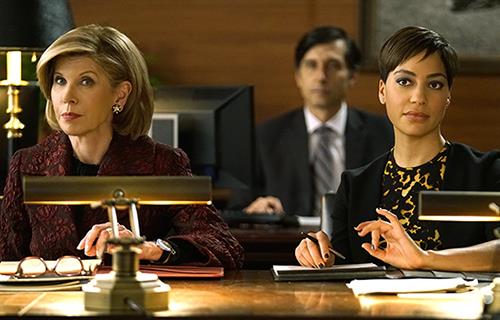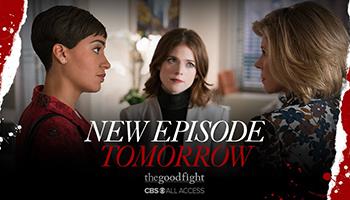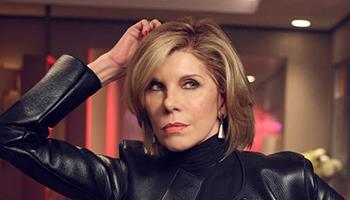'Good Fight' Presents Some Great TV

Watching the passionate, powerful yet quietly low-key season premiere of The Good Fight last weekend, I was reminded of a wonderful line from an early episode of Law & Order. The original Law & Order, back when Michael Moriarty played DA Ben Stone and the scripts seemed witty, fresh and topical — “ripped from the headlines,” and yet strangely prescient as well.
“What are we going to use for probable cause?” Det. Mike Logan (Chris Noth) asks his partner, Det. Phil Cerreta (Paul Sorvino, in Sorvino’s one season as a Law & Order regular).
“A senile judge,” Cerreta replies, without missing a beat.
 A senile judge plays a key role in The Good Fight’s season opener. I use the present tense here because CBS is streaming the Good Wife spinoff on its All Access streaming service, not the main network. And as we all know by now, viewers stream TV shows where they want, when they want. Spoilers are more damaging to streaming services, because one never knows how many potential viewers haven’t got around to streaming that episode yet. At least, with a broadcast network, once an episode of a popular show has aired, it’s reasonable to assume that anyone who wanted to see that episode has already seen it.
A senile judge plays a key role in The Good Fight’s season opener. I use the present tense here because CBS is streaming the Good Wife spinoff on its All Access streaming service, not the main network. And as we all know by now, viewers stream TV shows where they want, when they want. Spoilers are more damaging to streaming services, because one never knows how many potential viewers haven’t got around to streaming that episode yet. At least, with a broadcast network, once an episode of a popular show has aired, it’s reasonable to assume that anyone who wanted to see that episode has already seen it.
I don’t think I’m spoiling it too much, though, to say that the senile judge who appears in The Good Fight’s season opener is a familiar character from The Good Wife’s seven seasons as one of TV’s most erudite, sharply focused dramas, from 2009-16.
That’s telling, because one of the things The Good Fight has managed to do so well is bring back so many characters from The Good Wife — leading and supporting characters, and even familiar cameos — but not the series’ star, and yet seem fresh and original in its own right.
Early reaction to The Good Fight’s first season has played along political lines. Judging from comments on social media, viewers seem to respond to it depending on their political views. Liberal-leaning viewers who tend to vote Democrat admire The Good Fight for its fight for social justice, its ethnically diverse cast and its constant raging against the machine. Conservative minded viewers who tend to vote Republican take issue with The Good Fight’s heart-on-sleeve politics and complain — judging from social media anyway — that where The Good Wife was a courtroom drama first and a political show second, The Good Fight has it the other way around.
I would argue that isn’t so much an indication of a liberal Hollywood bias at work — again — as it is a reaction to the politics of the moment. The Good Fight’s makers, it seems to me, see themselves as speaking truth to power — i.e. the Trump years — in the same way Sorkin saw himself as speaking truth to power with The West Wing, which aired predominantly during the George W. Bush years.
It’s selling The Good Fight short, though, to simply dismiss it as a political polemic. As a viewer looking for an evening’s hour of good entertainment — something that makes me laugh as well as think — I find The Good Fight to be one of the most consistently entertaining dramas on TV, a show that takes its audience seriously and gives them credit for thinking, that raises serious issues in a lighthearted but never condescending or patronizing way, a show that has heart and soul and moments of genuine emotional power, and tells a cracking good yarn besides.
The Good Fight’s detractors accuse it of being obvious and over the top, but much of what I admire about it is exactly the opposite — the way some of its best moments are subtle and understated, implied but left unsaid.
That diverse cast, for one.
Good Fight has one of the most ethnically diverse ensembles in a TV drama this side of Fox’s Empire or one of David Simon’s HBO ensemble pieces, and yet no one associated with Good Fight — in front of or behind the camera — brags about that.
 J.J. Abrams, when he was introducing Lost to TV audiences, famously said that a diverse cast is most effective when no one makes a big deal about it, when it’s plainspoken and honest, when it simply presents a cast as not being Asian or African-American or Latino or native American but simply characters, real three-dimensional characters facing the same life issues everyone else does. In an ideal TV world, Abrams said, the characters in an ensemble drama are ordinary, everyday people you might meet every day on the street, a world in which any character, lead or supporting, can be played by any actor, regardless of skin color or ethnicity.
J.J. Abrams, when he was introducing Lost to TV audiences, famously said that a diverse cast is most effective when no one makes a big deal about it, when it’s plainspoken and honest, when it simply presents a cast as not being Asian or African-American or Latino or native American but simply characters, real three-dimensional characters facing the same life issues everyone else does. In an ideal TV world, Abrams said, the characters in an ensemble drama are ordinary, everyday people you might meet every day on the street, a world in which any character, lead or supporting, can be played by any actor, regardless of skin color or ethnicity.
The Good Fight’s creators, Michelle King and Robert King, took The Good Wife’s liberal-leaning, pro-Democrat politics and sharpened their lens for the Trump era, but Good Fight is by far the more ethnically diverse show, despite the consistently fine Christine Baranski reprising her Good Wife character of Diane Lockhart as the lead.
There’s Cush Jumbo — a UK actor through-and-through, though you’d hardly know it from her perfect Americanized accent and Chicago mannerisms in Good Fight — as ambitious courtroom crusader Lucca Quinn, a younger lawyer who finds herself playing moral and legal sounding board to Baranski’s older, wiser, more experienced Lockhart, who now finds herself working as the junior partner in a firm where ordinarily she would have been the boss.
There’s Delroy Lindo as Adrian Boseman, senior name partner at Reddick, Boseman & Kolstad, the firm Lockhart moves to after she loses her life savings in a financial scam. There’s Nyambi Nyambi as Jay Dipersia, the firm’s lead investigator, a recurring character in Good Fight’s first season now promoted to series regular, as is Michael Boatman’s Julius Cain, the firm’s former managing partner. Then there’s Erica Tazel as name partner Barbara Kolstad, and, new to season two, Audra McDonald (right) as Liz Lawrence, Boseman’s ex-wife and, more important to The Good Fight’s courtroom stories, a former United States Attorney who — like Alicia Florrick before her — is jumping back into the game.
Character is one thing. Story is quite another, and it’s here where co-creators and show runners Michelle King and Robert King excel. In its roller-coaster, often entertaining first season, The Good Fight tackled issues surrounding cyberterrorism, offshore banking, dark money, medical ethics (is a doctor who performs life-saving surgery on a known terrorist legally complicit under present-day laws?), anonymous phone calls, fake news, hate speech and, just in case you worry Good Fight is becoming too serious — i.e. pretentious — for its own good, strange comments in elevators and nefarious chicanery at pretentious art gallery showings.
The Good Fight’s deft combination of drama and comedy, shot through a prism of anger and stories ripped from the headlines, underpinned by sharp, witty dialogue, makes The Good Fight one of the more entertaining, challenging dramas on TV today — a show even a senile judge might appreciate.
Yes, it’s that good.